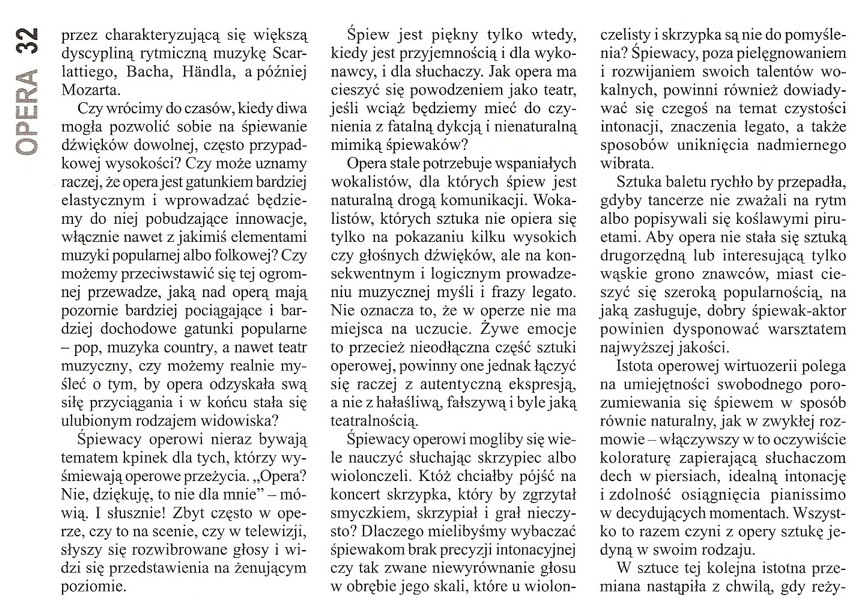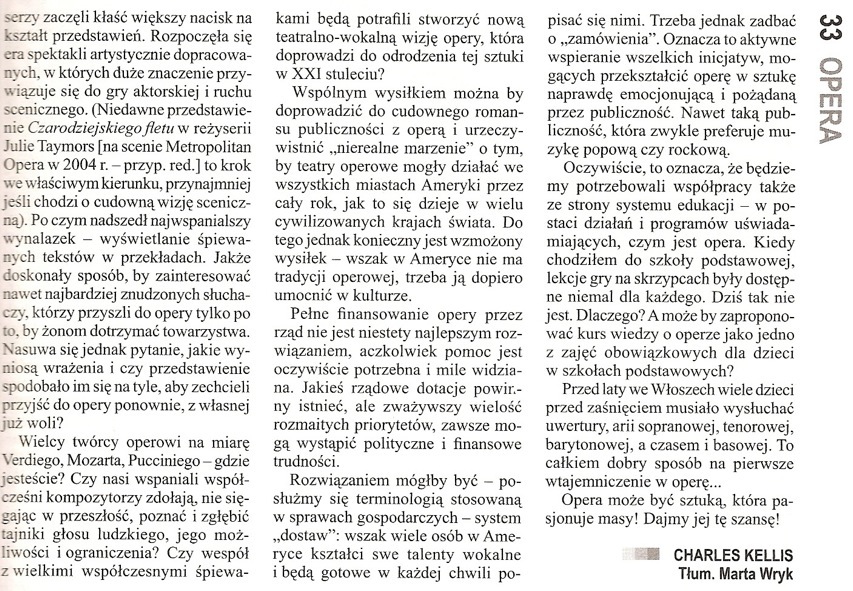CHARLES KELLIS


Opera Coming of Age
by Charles Kellis
The opera world is on the threshold of witnessing big changes with the emergence of Hollywood and Cinecitta style operatic productions. We are actually seeing opera from La Scala in the movies and "Lucia di Lammermoor", on Times Square in New York, where the ball drops on New Years Eve, and what about that wonderful coup d'etat -"Lucia", advertised all over New York City and even on the sides of local buses?
This new vision of trying to make opera more available deserves much applause. We must, however, still aggressively continue searching for even more creative innovations. Throughout the history of opera there have been many diverse developments that affected both the singing and the style of performance. Since we seem to go in cycles, the hope is that with this latest stimulus, the time has now come for a fresh look at where opera is headed in the 21st century.
Arturo Toscanini had a big hand in the first modern artistic changes, ushered in around the early and middle part of the last century. His influence initiated a more precise adherence to what individual composers intended. He took on the grandstanding of some artists who gave little credence to musical structure -indulging only in the egotistic display of their own voice.
His disciple, Riccardo Muti, carried on the tradition and gained a reputation –in his opera conducting - for hardly ever deviating from the printed score, even to the extent of eliminating many traditional cadenzas and interpolated high notes. Although this might be seen as being too severe, it made the music come first, ahead of some of the sloppiness and grossly inaccurate treatment of the past.
Isn't this, however, just another case of history repeating itself? Didn't this also happen in the16th and 17th centuries when Opera was first born? During the early Baroque period, monody was almost entirely improvised, sometimes giving in to cadenzas that were longer than the whole aria, that often, almost put the orchestra to sleep -waking up just in time to play the last final chord. This tradition of uncontrolled musical improvisation -although it may share an imaginable connection to improvised jazz- eventually gave way to the more organized, rhythmically moving accuracy of Scarlatti, Bach, Handel and later, Mozart.
Will we ever go back to the days when a diva could just sing with musically uncontrolled sounds and not be able to distinguish what pitches she was trying to reach? Or will we see more flexibility in opera, experiencing exciting innovations, even including the possibility of incorporating some of the popular -less vulgar, please- folk music of our time? Can we reverse the great imbalance between opera and the ostensibly more successful and lucrative popular venues –pop, country music or even musical theater- and can we realistically aspire to the time when opera will reach its full potential, finally becoming the preferred performance of choice?
Opera singers have been repeatedly caricatured by people who laugh and make fun of operatic impressions. "Oh, opera, no, no thanks, not for me. It sounds false. I don't like it." And rightly so! We have, too often, been subjected to opera in the theater and on television with wobbly voices –excessive vibrato- and ineffective quasi embarrassing performances.
Beautiful singing is only beautiful when it is easy and comfortable for the singer as well as for the audience. How can opera really be successful theater if we are going to be attacked with sounds that are full of harsh diction and unnatural facial expressions that are outrageous in their anti-theatrical distortions.
Opera needs the continuing emergence of wonderful singers who can communicate naturally and use their voices ever more effectively, and who can successfully carry the story line that makes for genuine vocal theater -not only a few exciting high notes or loud volume without the basic structure of legato. This is not to imply that unbridled human emotion should be stifled. It is a part of the blood and guts of opera itself, but it could be more organically energizing with authentic expression -not just loud, careless and false theatrics.
Perhaps opera singers can learn from listening to the violin or cello. Who would appreciate going to a violin concert -hearing squeaks, harsh bowing and playing out of tune? Why should singers be forgiven, and allowed to attack us with imprecise intonation and the kind of unbalanced tone that a cellist or violinist would never get away with -besides improving their musicianship, they might also learn something about purity of tone, the value of legato and also how to avoid excessive vibrato,
The ballet would die if it gave in to unintended lapses of rhythm or poorly executed, awkward pirouettes. The great singing actor has to achieve similar kinds of disciplined, artistic skills in order to save opera from becoming a second class art form, or merely existing for some select few "conoscenti", without the broad popular appeal it rightly deserves.
The real essence of operatic virtuosity is the ability to freely communicate with the naturalness of an ordinary conversation, -including, of course, wonderful breathtaking coloratura roulades, extraordinarily controlled accuracy of pitch and pianissimo availability at crucial moments. All of the great extraordinary attributes that make opera truly unique.
The next significant operatic change came when the stage director began to exert more pressure for artistically theatrical performances. This brought a new era of more creative productions, effectively yielding greater prominence to acting and stage movement. (The recent production of Julie Taymor's "Magic Flute" is a step in the right direction, at least in it's wonderfully conceived theatrical vision.) Then came a most wonderful invention -"Subtitles!" What a great tool to engage even the most bored corporate opera visitor, who most probably attended only through the insistence of his wife. But, did he come out of the experience with favorable reviews? The question is, will he be sufficiently seduced to happily want to return for a subsequent performance?
(Great new composers of the stature of a Verdi, Mozart, or Puccini. Where are you?) Will some of our wonderful contemporary composers- without needing to go backward in historical, musical innovation- acquire the complete and thoroughly investigated knowledge of the human voice -its potentials and limitations. And also have the insight and skills to transform opera into an era of a new theatrical vocal vision which -together with the graceful evolution of superior vocal performers -could lead opera into a 21st century operatic rennaisance?
This could grow into a blossoming love affair with opera and might just bring about the "impossible dream" of having an opera house in most American cities that could function year round -much like in many other civilized countries around the world. Unfortunately, because of the lack of an operatic tradition in America, a more vigilant effort will be required. It has to be embedded into the culture.
FINE
Completely subsidizing opera by the government, unfortunately, is not a winning solution -even though assistance is certainly always needed and welcome. Some help, of course should still be forthcoming, but because of numerous other priorities, there always seems to be too much political and fiscal opposition.
The answer, in purely economic terms, is to be able to deliver the "supply"–a great number of American singers are continuing to improve their skills and will be ready when called upon- but we must also cultivate the "demand". This means aggressively exploring every possible initiative that will result in transforming opera into a truly exciting and pleasurable experience–finally engaging Americans in an operatic vision that can be understood and appreciated by even the average pop-music or rock-star fan.
Of course, it follows that we will also need the participation of the school system to encourage more exposure and to initiate more programs of inclusion. When I was going to school, there were widely available violin lessons in the early grades of the public school system. What happened? What about trying a course in opera appreciation as a requirement in the early grades?
Years ago in Italy, many children would not be allowed to go to sleep at night without first listening to an overture, an aria by a soprano, a tenor, a baritone, a mezzo and sometimes a bass. Not a bad way to establish a tradition of operatic involvement.
Opera can be great! Let's give it a really fair chance!






